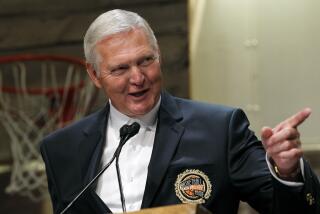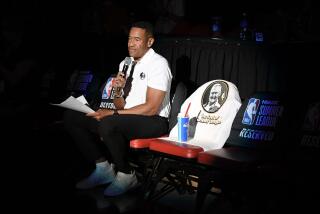‘West by West’ review: Jerry West reveals abuse, depression
- Share via
Jerry West is going to hate his autobiography. I will repeat that, for any among you who wish to call a timeout for a further review of the previous sentence. Jerry West is going to hate his autobiography.
He wrote it, or cowrote it. He must be proud of finishing it. All or most of it is undoubtedly true. Yet a day is going to come, if it hasn’t already, when the subject of “West by West: My Charmed, Tormented Life” is going to rue having put his entire life on public display this way, wishing that he had instead flipped the whole manuscript onto a grill and set fire to it. Because, you see, apart from his being an unquestionably successful, uncommonly admired human being, Jerry West, that tall and talented straight-shooter of West Virginia, the West Coast and thousands of basketball points in between, is a man traveling with a lot of demons.
Pick up a copy of this brutally candid account of his life and you will understand him quite a bit better. Come to know him totally, though, you will not. You can’t. His friends can’t. His family can’t. He is unknowable. “I like to keep people guessing,” West writes at one point in this book. And, in another: “I often do things that surprise me, not to mention others.”
If perhaps he kept a majority of the people he met at arm’s length, it turns out he might have had good cause. He was physically abused in his youth, despising his father to the extent that young Jerry kept a gun under his bed and entertained thoughts of using it on the old man. He has been haunted all his life by a beloved brother’s death in military combat. He suffers from a clinical depression so acute that even his daily Prozac doesn’t always keep him from feeling suicidal. A woman who ultimately would marry him found West to be “the saddest man she had ever met.” Years later, she wrote a note to his boss, Lakers owner Jerry Buss, to warn him that her husband was “a very tormented individual” on the brink of self-destruction.
We plainly are dealing here with someone far more complex than an enigmatic fellow who once walked out on his own surprise party, who skipped NBA nights held in his honor, who came to a Lakers news conference to be introduced as the team’s new coach but promptly announced to everyone there (including his boss) that he would be no such thing, a man who no-showed his own retirement announcement, a man so stressed out that he could not bear to watch his own team while it was playing in a championship game.
And this is from a guy who has done everything a basketball man can do — school idol, Olympic gold medalist, Hall of Fame player, title-winning exec, statue outside the arena. His very image is the NBA’s corporate logo.
In his own prime, he cut a dashing figure around a fast-lane town, that of a fashion-obsessed, Ferrari-driving playboy (and admitted philanderer) with an unconventional need to take side streets in order to avoid stoplights. He is a guy who plays a round of golf so fast, you think he must be double-parked. He speed-eats a meal, is done before some at his table have chewed the first bite, then compulsively grabs the tab with two of basketball’s quickest hands.
He eschews publicity or self-aggrandizement, yet claims in his book that a great regret of his life is not returning to his native West Virginia and running for governor. You could knock Shaquille O’Neal over with a feather before you could picture Jerry West giving a rousing campaign speech and kissing a baby.
Did you know Phil Jackson once ordered West out of the Lakers’ locker room, or that West felt that Jackson “had absolutely no respect for me”? Not me. It is one of many topics openly and bluntly addressed in this book, on which he collaborated with Jonathan Coleman. There are various fallings-out with employers, a dislike for the fatuous Jack Kent Cooke, an impression that Buss bore a growing resentment toward him, believing that West, the team’s esteemed GM, either received or accepted too much credit for the Lakers’ phenomenal success.
Cut to July 11, 1996. I am in the GM’s private office, the Forum, Inglewood, just West and new Lakers coach Del Harris and me. At a minute past 2 p.m., Orlando’s extra-extra-large colossus O’Neal will become a free agent. West has a wide-open shot at him. And with shots, you know, he usually hits. He recently has acquired a teenager with potential, a kid named Kobe. A few clock ticks from now, he can formally invite Shaq to join the club. It’s all good. Except while we sit and wait, shooting the breeze, West out of the blue begins saying what he really wants to do, once Shaq is on board, is quit this job for good. “I don’t enjoy it most days,” he says. “I’d rather be doing something else.”
Five will get you 10 he still isn’t sure what to do with his life. He has a wife and kids who love him, including the son who finds him “weird,” even though he’s admittedly been a little slow to love them all back. He claims to have precious few intimate friends among the hundreds who know him (or think they know him), but if Los Angeles threw a Jerry West Day, a few hundred thousand people would likely show up. Jerry West probably would not.
True story, from his book: Jerry West is in a restaurant, at least 14 more at his table. A steak is served. He thinks it’s raw. A second is brought. He thinks it’s too well done. Now, a third. Nope, too rare again. West says forget it, I’ll eat this. The manager says there will be no bill for his meal. West demands that he does get a bill. He vows never to return if no check is brought. A check is brought. West can’t believe they actually did bring him a check. He gets up and walks out. A while later, he walks back in, carrying in food from a different restaurant. “Is that a rational thing to do?” West rhetorically asks. No, but being rational is not what this person does best. And it is why he has always been — and continues to be — very, very rare.
Downey is a former Times sports and metro columnist.
More to Read
The biggest entertainment stories
Get our big stories about Hollywood, film, television, music, arts, culture and more right in your inbox as soon as they publish.
You may occasionally receive promotional content from the Los Angeles Times.










